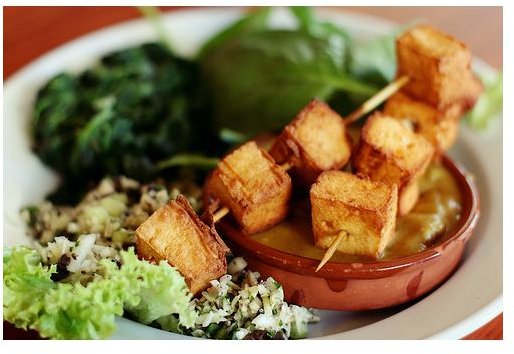Potential Health Risks of Vegan Diet Eating
The Vegan Diet
Some people choose to consume a vegan diet because it is better for the environment, others because of moral issues with eating animals or fish and animal products. Some people go vegan for health reasons — possibly to lose weight, lower cholesterol levels or improve digestion.
Veganism can have many benefits and it can be an adventure in food as you are forced to explore all the many ways that fruits, vegetables, nuts, seeds, legumes and grains can be enjoyed. You will also probably be exposed to foods that you would never have tried as a non-vegan. The moral and environmental benefits of giving up meat, poultry, fish, dairy and eggs comes automatically. The health benefits only come to those who focus on a balanced diet while being vegan. This includes understanding the health risks of vegan diet and finding solutions for possible deficiencies.
Calcium, Iron and Zinc
Calcium, iron and zinc are three minerals that are found in abundance in the meat, poultry, fish and milk of a non-vegetarian diet but they may be difficult for vegetarians and vegans to get enough of. Calcium is well-known as being essential for strong teeth and bones but it is also important for healthy gums, nerve impulses, a normal heart rhythm and the prevention of cardiovascular disease. Iron is needed for the formation of hemoglobin and the oxygenation of red blood cells. Zinc is essential for the well-being of the reproductive system, for immune health and healing and for collagen synthesis.
Not getting enough of these minerals opens up the body to at first minor problems such as lowered immune defenses and reduced energy levels. Over time a lack of calcium, iron and zinc can cause have something to do with the development of some chronic diseases such as osteoporosis and heart disease.
It is not difficult to get more then enough of these nutrients from a healthy vegan diet, but it is important to focus on excellent food sources. For calcium be sure to include lots of green leafy vegetables, and a variety of them. Eat almonds, blackstrap molasses, tofu, asparagus, oats, sesame seeds, cabbage and figs on a regular basis. Consider supplementing with sea greens and herbs, which are highly concentrated sources of vitamins and minerals. For calcium try kelp, dandelion greens, oat straw and raspberry leaves.
Iron is also found in green leafy vegetables, almonds, blackstrap molasses, soy products, sesame seeds, raspberry leaf and kelp. Other good sources include wheat bran, beets, lima beans, lentils, peaches, dulse and licorice.
For zinc eat plenty of mushrooms, pecans, soy, brewer’s yeast, kelp, sunflower and pumpkin seeds and whole grains. Nettles, rosehips, chickweed and dandelion are all herbal sources.
Vitamin B12
A vegetarian or vegan diet tends to be very high in many vitamins, including vitamins C and E, folic acid and the carotenoids. The one vitamin that it may be lacking in is vitamin B12. This nutrient is very important for the well-being of the nervous system. It also helps to lower homocysteine levels, an amino acid that has been implicated in the development of heart disease.
Vitamin B12 is found almost exclusively in animal products, fish and seafood. To make sure you are avoiding the pitfalls of a potential deficiency try adding brewer’s yeast to your diet. Sea greens, such as kelp, dulse, nori and kombu are also good sources. Regularly consuming tofu, soybeans and soymilk can also help as soy products do contain vitamin B12.
Omega-3 and Saturated Fatty Acids and Protein
A vegan diet is likely to be very high in omega-6 fatty acids and low in saturated fatty acids. To some extent this is beneficial as a diet high in
saturated fat can contribute to cardiovascular disease. Some saturated fatty acids however are important for brain health and cell membrane integrity. Even more important for heart health are plenty of omega-3 fatty acids, which are found in high quantities in fatty fish. A vegan diet may also be full of carbohydrates, but depending on the foods consumed it may be low in protein. A protein deficiency is rare, even with a vegan diet, but being conscious of balancing proteins, fats and carbohydrates is important for overall well-being.
To eat a balanced vegan diet and avoid potential health risks be sure to include plenty of fat and protein sources. Snack on nuts and seeds on a daily basis for a variety of fatty acids and protein. Use a variety of vegetable oils, including hemp seed, flax seed and avocado oil. Try using grains that are also good sources of fatty acids and amino acids, such as amaranth, quinoa and brown rice. Regularly eat beans and eat a variety of them. Start cooking with lentils, lima beans and kidney beans. Add chickpeas to salads. Tofu is an excellent source of protein as well as many much needed vitamins and minerals for vegans. Try substituting soymilk for regular milk and eating tofu at least twice a week.
It is so easy to avoid the potential deficiencies and health risks of veganism with a balanced diet. Vegetable-products are packed with nutrients, including amino acids and fatty acids. Be sure to eat a variety of food sources and incorporate the foods that many non-vegetarians do not regularly consume but are incredibly good for you such as nuts, seeds, sea greens and tofu. Consider supplementing with flax seed oil, blackstrap molasses and brewer’s yeast. While a healthy diet is vital, you can also consider taking a multi-vitamin for a back-up source of vitamins and minerals.
References
Health effects of vegetarian and vegan diets. The Proceedings of the Nutrition Society, National Institutes of Health Archives. (https://www.ncbi.nlm.nih.gov/pubmed/16441942)
Balch, Phyllis A. " Prescription for Nutritional Healing." Fourth Edition (Penguin Books, 2006).
photo by Suzette Pauwels/flickr
photo by Norwichnuts/flickr
